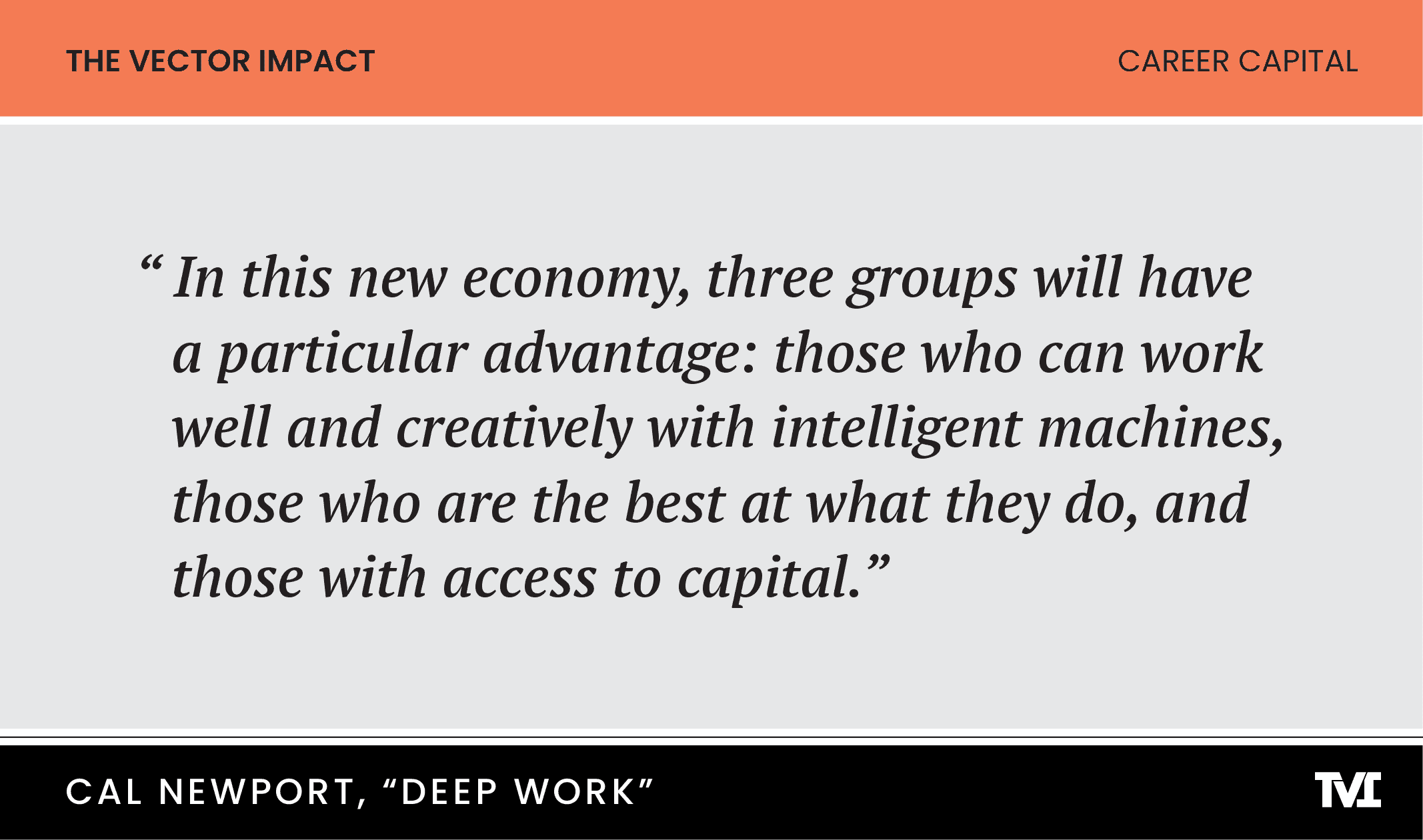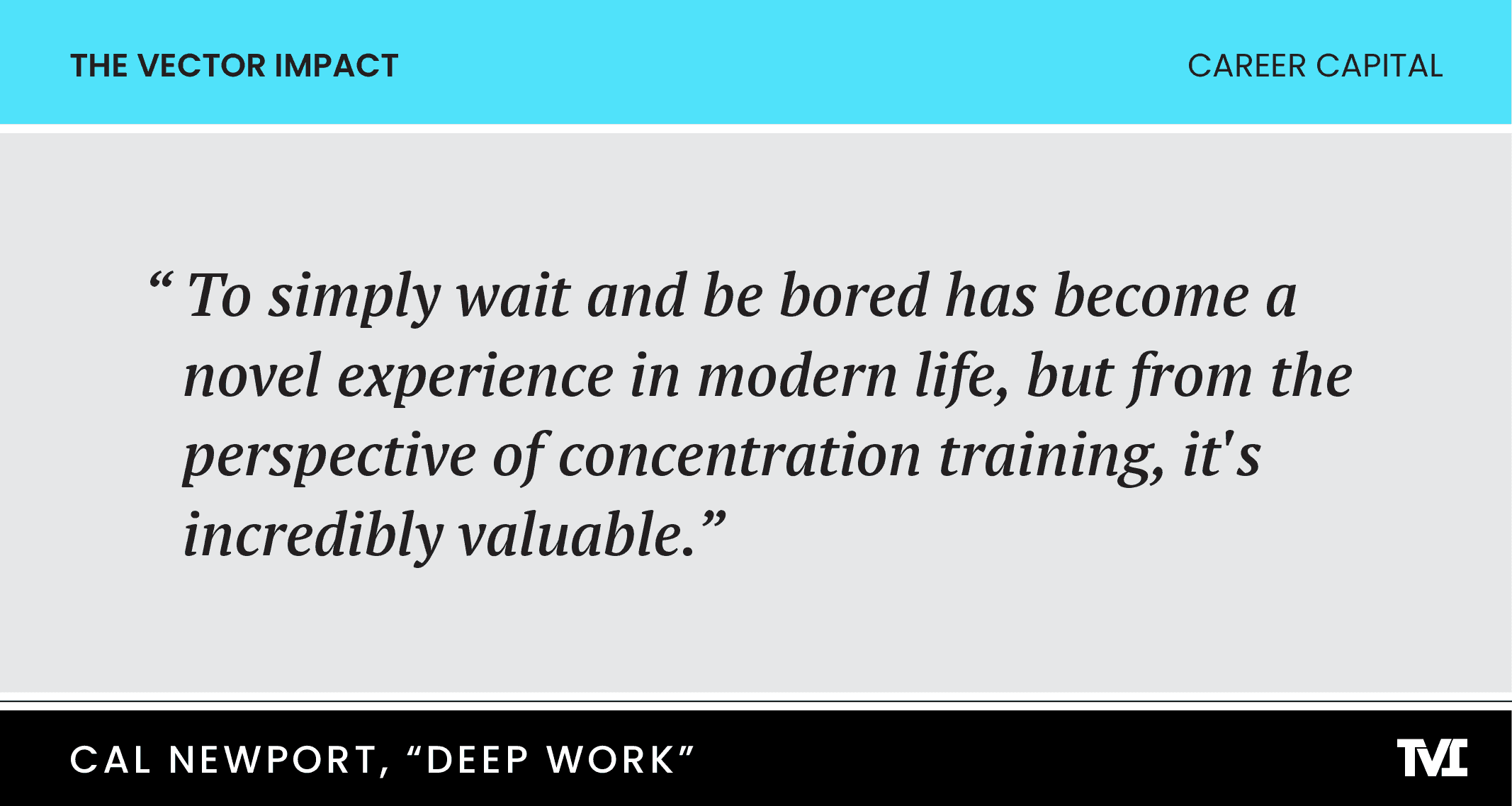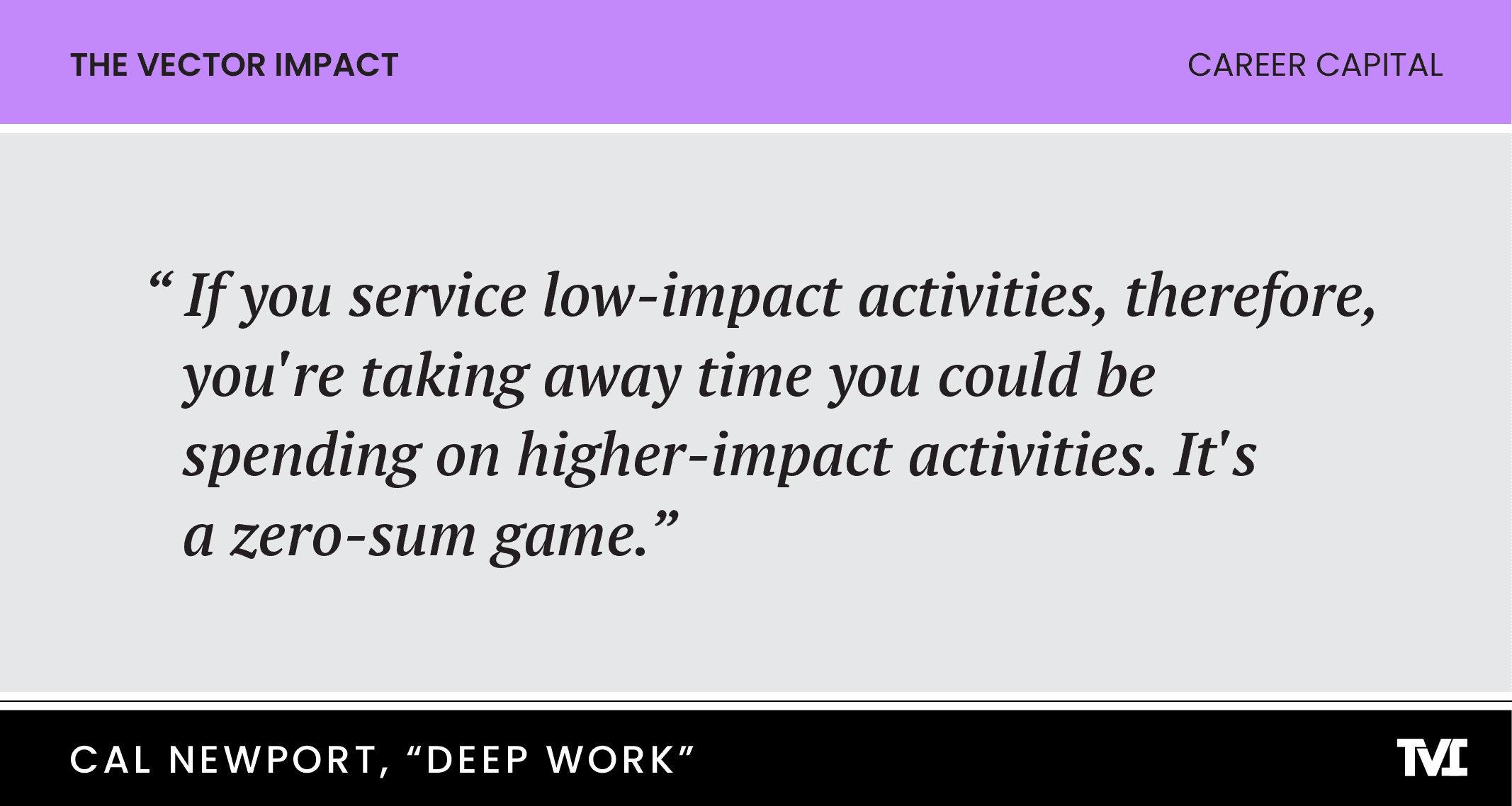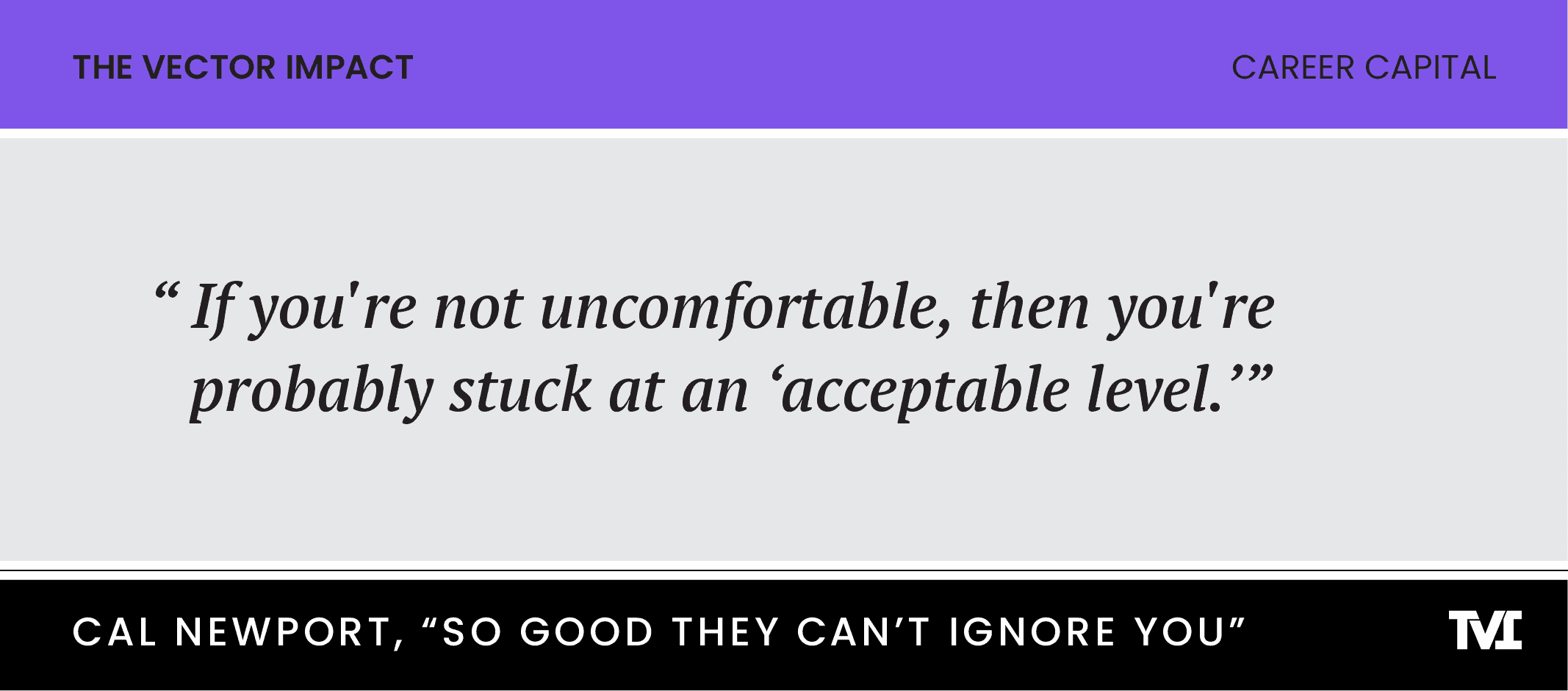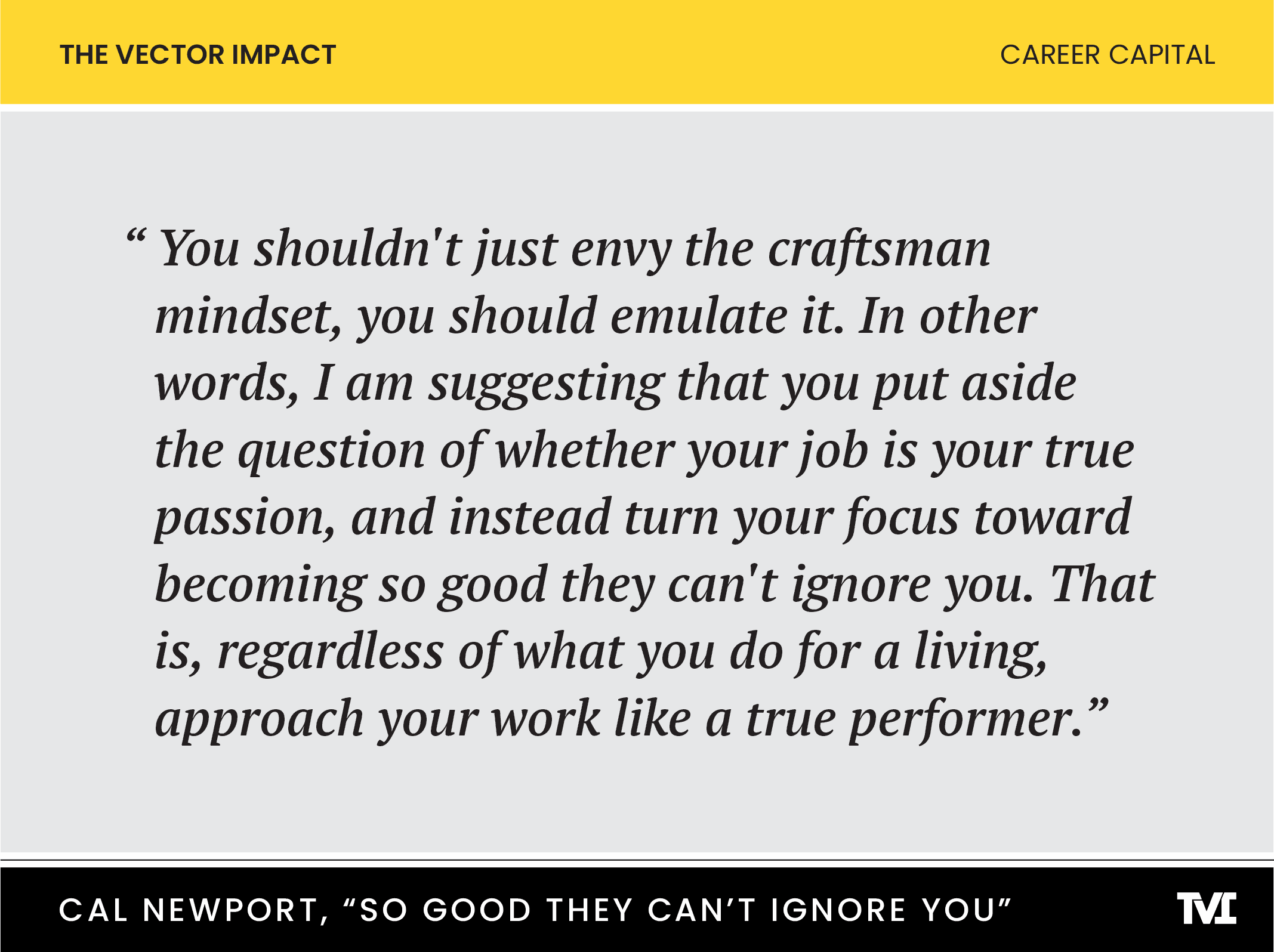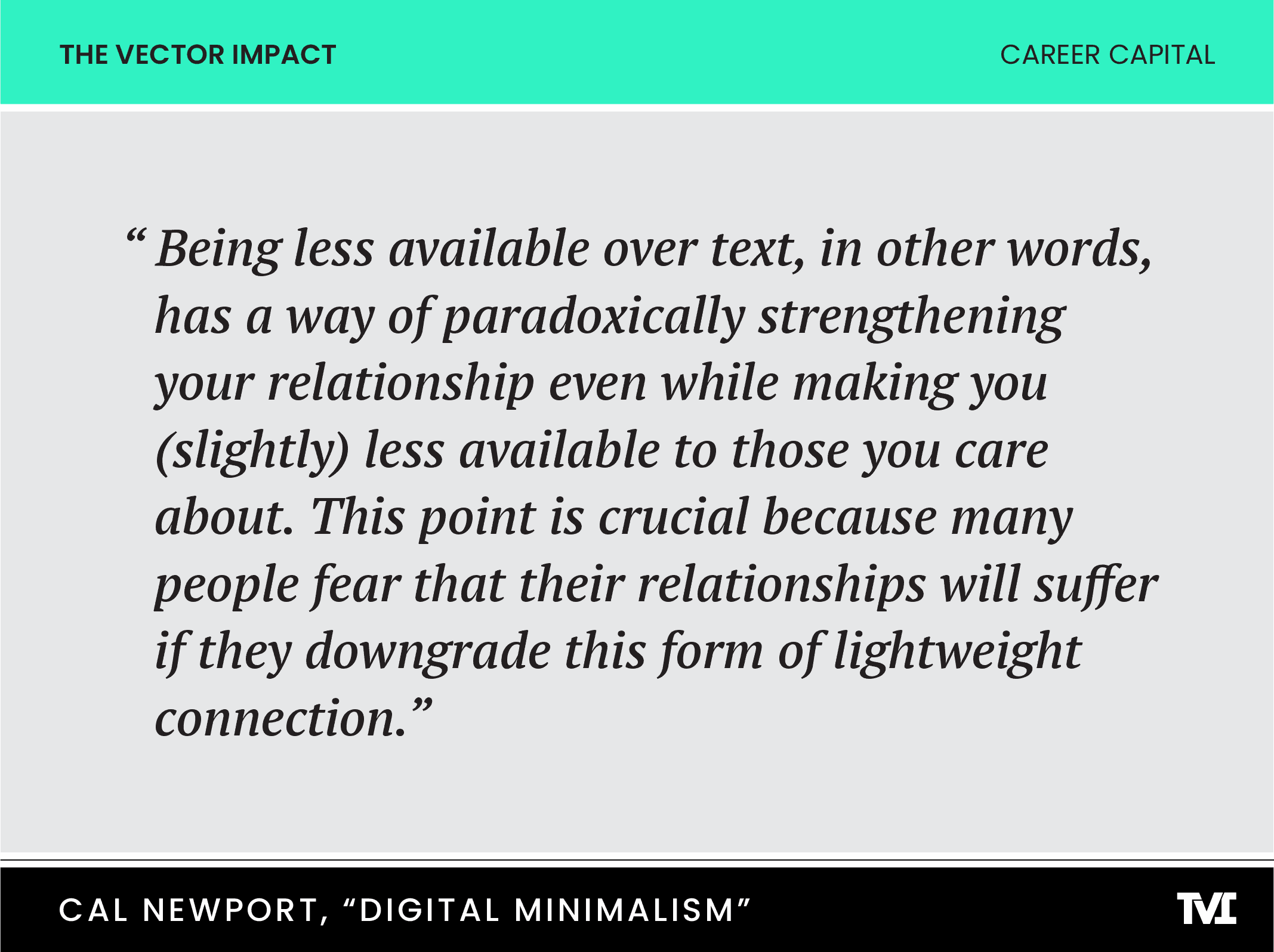
If you want to learn how to advance in your career, you need to have career capital.
Career capital is like the equity you have as an employee. It’s your worth not just to your current employer, but to the marketplace as a whole.
It helps you:
- Command a higher salary
- Have more flexibility in your role
- Have more autonomy and authority at your job
When you have more career capital than your competitors and peers, you have more control over your future because you’re less of a commodity.
You’re irreplaceable. You become what Seth Godin calls the “lynchpin” of your organization.
If your value is that of multiple employees, you can get paid the combined salary of multiple employees.
You open up the door for opportunities like promotions, partnerships, and even real equity in a business.
The job market is becoming more competitive. You have to compete with overseas talent who will do the same work for less money. You have threats like AI displacing certain roles and even entire industries.
The days of going to college, learning one skill, and rising up the corporate ladder are dead. You need to develop serious career capital to get ahead.
How do you define career capital and why does it matter?
“If your goal is to love what you do, you must first build up ‘career capital’ by mastering rare and valuable skills, and then cash in this capital for the traits that define great work.”
—Cal Newport, “So Good They Can’t Ignore You”
I learned the concept of career capital from Cal Newport in his book “So Good They Can’t Ignore You,” which is all about becoming so skilled at what you do you’re empowered to have any career you want.
Out of all of the concepts in the book and the ways he describes career capital, this definition is my favorite. Career capital comes from having skills that are rare and valuable. You want to become the opposite of a commodity, so you can let economics work in your favor.
Why is working at a fast-food restaurant such a low-wage job? Because you can practically take any human being and install them into a fast food restaurant. There is a basic set of activities required to fulfill the job.
This is Economics 101. Whenever the supply of something is high, the demand for it decreases and it drives the price down. Since anyone can flip burgers and work a fry machine, it doesn’t demand high wages.
If you want to develop career capital you have to get good at something few people know how to do that the market also values. Take people who work in STEM for example. STEM has more demand than supply.
There are tons of new companies and sectors opening up in the STEM fields but most people don’t go to school for those fields because it’s more difficult to learn engineering, physics, data analytics, and machine learning than it is to get a basic communications or even a business degree.
A telltale sign of a field that has career capital? It’s difficult, strenuous, tedious, and sometimes even boring to learn.
So the skill has to be rare, but it also has to be valuable. You can acquire a skillset that very few people know how to do but isn’t valued by employers in the marketplace (like ancient calligraphy).
It’s funny I mention that, though, because the skill of calligraphy might not have career capital in one context, but it does in another. I actually watched a video from a business coach about a student who makes money online teaching calligraphy to other hobbyists. Also, Steve Jobs famously used what he learned in a college calligraphy class to guide the style when it came to fonts he used in Apple products.
All of this is context-dependent, which is why we’re going to spend the rest of this piece explaining more about career capital, skill development, and the traits required to advance in your career in 2025 and beyond. But first…
Forget about following your passion
It’s one of the biggest fallacies in career advice today. Passions don’t come before skills—they come after. When you get good at something valuable, passion follows.
The problem with focusing only on passion is that it makes you ask the wrong questions:
- “What can this job offer me?”
- “Is this who I really am?”
- “What do I truly love?”
These questions keep you stuck and unhappy. Instead, adopt what’s called the craftsman mindset.
Ask yourself: “What can I offer the world?”
Ask questions like:
- “What skills are in high demand in my field?”
- “How can I provide more value to my organization?”
- “What problems can I solve that others can’t?”
- “Where can I develop expertise that would be valuable?”
I remember when I worked at a marketing agency as a project manager. Instead of resting on my laurels, I spent all of my spare time studying marketing, sales, social media, SEO, and all of the skills I knew I could use to bring value to my company even though I wasn’t in those departments.
I just managed projects, but secretly, I longed to become part of marketing and knew I could help the company thrive. So, I would wrap my learning into team meetings and help make suggestions for the SEO and marketing department. This led to me becoming the company’s marketing director with a substantial raise.
We didn’t have a marketing director position at the time. I pitched the idea of creating an entirely new job for myself because the company itself needed to focus more on its own marketing instead of just marketing for clients.
They said yes.
I ended up leaving to become a full-time writer, but we were in talks about making me a partner and getting equity in the agency.
This is the power of taking the time to build career capital. You can invent a new career for yourself because you are learning new skills, combining them in unique ways, and proving yourself to be valuable.
Build career capital.
(And get paid.)
The power of skill stacking
Want to build rare skills fast? Use skill stacking. The problem with only being good at one thing is that there is still a pretty large pool of competition. But if you are good at the intersection of multiple complementary skills, then you can command more career capital because that skill set is rare.
For example, let’s say you do social media marketing. You know how to create social media content online. But what if you had a set of complementary skills:
- Email marketing
- Running advertisements
- Setting qualified appointments in DMs
- Closing sales calls
If you have a variety of these skills when you’re becoming a full-stack marketer, you have a lot more career capital because most people are not willing to go through the process of learning all those skills.
And that process will require that you master this one thing.👇🏾
Practice deep work
In today’s world, a lot of people do not have long attention spans. We have social media apps, email, Netflix, all these different distractions where a lot of people have fragmented minds. They can’t sit still long enough to learn and do complicated tasks.
This is where deep work comes in, a concept developed by Cal Newport.
Deep work refers to the ability to focus intensely on cognitively demanding tasks without distraction. People who master this skill automatically build more career capital than those who don’t.
Here’s what makes rare and valuable skills stand out: they all require high cognitive demand.
You can’t develop these skills through shallow, distracted work. They require you to focus intensely for long periods—typically 2-4 hour blocks of completely undistracted time.
Let’s be honest about how most people work in corporate environments. In an 8-hour workday, the average person might only get 2-3 hours of actual work done. The rest is lost to:
- Constant email checking
- Random web browsing
- Social media breaks
- Unnecessary meetings
- Task switching
- Office distractions
- “Busy work” that feels productive but isn’t
This creates an enormous opportunity for those with a forward-looking mindset. If you can consistently put in 4 hours of genuine, focused deep work each day, you’re already outperforming most of your peers.
While others are bouncing between tasks and barely scratching the surface of complex problems, you’re diving deep and building real expertise.
Think about tasks that build valuable career capital—writing complex code, developing strategic plans, solving difficult technical problems, and creating comprehensive analyses.
None of these can be done effectively in 15-minute bursts between meetings. They require long periods of uninterrupted focus.
The ability to do deep work isn’t just about productivity—it’s a rare skill in itself. When most people can’t focus for more than 30 minutes, being able to work deeply for 2-4 hours at a time makes you stand out. It’s your secret weapon for building career capital faster than others.
6 keys to building valuable career capital
Now that you understand what career capital is and how deep work helps you build it, let’s break down specific strategies
I took some of the most potent quotes from both “Deep Work” and “So Good They Can’t Ignore You” and expanded on them to give you actionable steps for building more career capital.
1. Winning in the new economy
Looking at the three groups Cal identifies as having advantages in this economy, we can draw clear parallels to our current situation.
Those who can work well and creatively with intelligent machines: Though the rise of AI happened after Cal’s books were published, he was prescient in seeing that people who can effectively interact with machines would succeed because they can multiply their effort.
Companies are always looking for people who get the most output for the least input. If you have one employee with the ability to interact with machines and do the work of 10 people, that person becomes incredibly valuable. People who don’t learn to harness the power of tools like AI will be left behind in our new economy.
The next advantage goes to those who are best at what they do: These will be the people who take the most advantage of AI and emerging technologies. We’re talking about the very best in software engineering, machine learning, and data analytics. These are areas I mentioned earlier that have career capital because the skills are both rare and valuable, requiring high cognitive ability. You don’t have to be in one of these fields, per se, but you want to be the best at what you do and have technical skills that integrate with machines. It is a must.
The last advantage is access to capital: As a super-employee, you’ll command a higher salary, which means you have access to capital. As I’ve mentioned in other articles, like when I wrote about the four C’s to getting rich, creating content and having access to code multiplies your leverage. This helps you make more money to invest in things like labor if you have a business. This gives you more capital, which helps you grow further in this economy.
2. Harnessing the power of boredom
If you want to be the type of person who can acquire career capital, you have to learn how to be bored.
When I say this, I quite literally mean you have to train yourself to be bored.
In “Deep Work,” Cal suggests the exercise of sitting down in a room, setting an hour timer, and doing nothing. Don’t look at your TV, don’t check social media, don’t check your email, don’t even try to meditate or focus on your breath to calm your mind—just sit there and be bored.
One thing you’ll notice about boredom is that it involves a particular sort of pain. You’re running away from distractions and it’s hard. Similar to resistance training—but for your mind instead of your body.
Just as a muscle must first tear and break down to be rebuilt, you need to tear down your overly distracted brain. Those dopamine receptors have been manipulated by social media algorithms, Netflix, your phone, and email.
You need to rewire your brain. I suggest going through a complete digital detox. (I wrote an article about that entire process.)
When you learn the art of boredom, you can empty your mind and gain clarity, which is necessary to master skills that will help you build career capital.
3. Leveraging your time to make more money
I’m reminded of something Jim Rohn, the self-help business guru, used to say that resonates deeply with the concept of career capital:
“Most people major in minor things.”
It relates to this quote from Cal. People don’t develop career capital because they don’t focus on acquiring rare and valuable skills. And they don’t do this because they spend time on things that have a low financial impact and a low overall impact.
This includes things like running constant errands, focusing on random busy work, and overemphasizing other factors. If you want to be someone who has more career capital and makes more money, you need to learn how to price your time. If you have an ideal hourly rate for your life, any task that falls below that rate should be delegated or outsourced.
I use a laundry service. I have a healthy meal service that delivers prepared meals. I have someone clean my apartment and a virtual assistant who handles the minutiae of my business, like answering emails.
Everything below my hourly output gets delegated, automated, or outsourced.
Many people are unwilling to do this because they fundamentally don’t understand how time and money work.
A lot of people try to save money by spending time. That’s the mindset of a poor person. Rich people spend money to save time so they can make more money.
While it might seem like an expense to hire a cleaner or have your food cooked or laundry done, if you look at it from a net financial perspective—and you’re spending that time learning valuable skills that will help you command more money in the marketplace—it makes financial sense to invest in these services.
4. Avoiding the comfort zone trap
People don’t spend time mastering rare and valuable skills that will make them more valuable in the marketplace because it’s hard. You have to become the type of person who can train themselves to like hard things.
There is no reality where you get what you want without going through the emotions associated with getting great at something.
I can tell you personally from running my business:
- learning how to market and sell products
- taking sales calls
- fulfilling orders for clients
- making connections
- creating content
- running ads
- handling emails
Every single day, I’m bumping up against the edge of my own limitations. I can feel it when I start to go past what I’m normally accustomed to grasping based on my current skills.
It doesn’t feel good in the short term. You feel dumb, you feel uncertain, and sometimes you don’t know which way is up or down. You must go through the steps, you don’t have everything figured out, you’re in over your head, and it feels straightup overwhelming.
Persist and give yourself grace (i.e., do not judge the quality of what you’re doing while you’re pushing to the next level). Understand that you will get better if you push through, and then you’ll acquire career capital.
You won’t get career capital in a place where you’re feeling comfortable all the time. So ask yourself:
What kind of person do you want to be?
Do you want to spend the rest of your life running from hard things, or do you want to get better?
There’s something powerful about mastering hard things and a certain happiness associated with doing it. Many people are miserable because they avoid these challenges.
Facing challenges and pain is uncomfortable in the short term, no question. But in the long term, it’s not only the most financially rewarding thing you can do for yourself but also the most spiritually, philosophically, and purposefully rewarding.
5. Embracing the craftsman’s path
I remember watching a video from Grant Cardone, a real estate guru who has built a billion-dollar net worth. He started his career as a car salesman, and he had a telling phrase: “Learn to get good at what you hate.” Grant hated selling cars, but since he was already doing it, he figured he might as well get good at it.
He became the best salesperson in his region and then used those sales skills to create training programs for other car salesmen, which was one of his first ventures into business. He took that capital and started investing in real estate. After successfully developing real estate, he started teaching others about real estate and crowdfunding deals.
Had he waited for the perfect passion project to get started, he would have been spinning his wheels forever.
Instead, he decided to work with what he had. Don’t suffer from the delusion that you’re going to magically start stepping up to the plate once you get that ideal role. You should be trying to become a craftsman and work as hard as you can in your current role.
One of my most transformative experiences was when I was a manager at a video store, making just $10 an hour. I treated it like it was my business because I was running the day-to-day operations. I took it seriously and tried to do my best.
As a result, all these different opportunities (like more lucrative jobs) started falling into my lap because people who came into the video store had connections and they saw the way I carried myself.
This is why you should do your best no matter what. You don’t know who you’re going to run into, you don’t know who’s watching, and you don’t know what future possibilities could be born from what you’re doing right now.
Don’t be short-sighted and only think about your feelings in the moment. Adopt a craftsman mindset so you can carry the work ethic, diligent attitude, and focus required for you to succeed at every venture you undertake in the future.
6. Leaning into the power of real connection
This last quote might seem like an afterthought or footnote, but it’s the most important thing you need to do to get this entire strategy to work.
Most people don’t set aside the time needed to create rare and valuable skills to develop career capital because they’re horrible at setting boundaries.
They care too much about what others think, they’re worried about external validation, they don’t want to let friends down, they don’t want to say no to invites, and they don’t want to fall out of their social circle and experience FOMO.
The people who care about you understand and appreciate your mission, and they’re willing to support that. And perhaps the ones who don’t shouldn’t be people in your life to begin with.
To have the best social relationships, it’s really important to fill your own cup before someone else’s. Serve yourself first so that you can be more present and available when it matters.
When you have more energy, when you’re more focused, when you have more clarity and purpose because you’re working hard, you will show up in a much more positive way.
Contrast this with trying to make yourself available to everyone. Since you’re living below your potential and you don’t have a mission, you’re not fully present when you’re with others. You’re not showing up as your best self because you’re spread too thin with too many obligations, which makes every individual interaction suffer.
Related:
The power of career capital
Career capital is the key to autonomy in your work. Without it, trying to gain more freedom or control in your career usually backfires.
The more career capital you build, the more options you have. Things like:
- Working remotely
- Choosing your projects
- Setting your schedule
- Commanding higher rates
- Creating your own opportunities
Remember: Building career capital takes time. You need patience and consistency.
Focus on developing rare and valuable skills through deliberate practice and deep work. Start today by choosing one skill to master. Give it your complete focus.
Keep at it…and watch your work and life transform.


